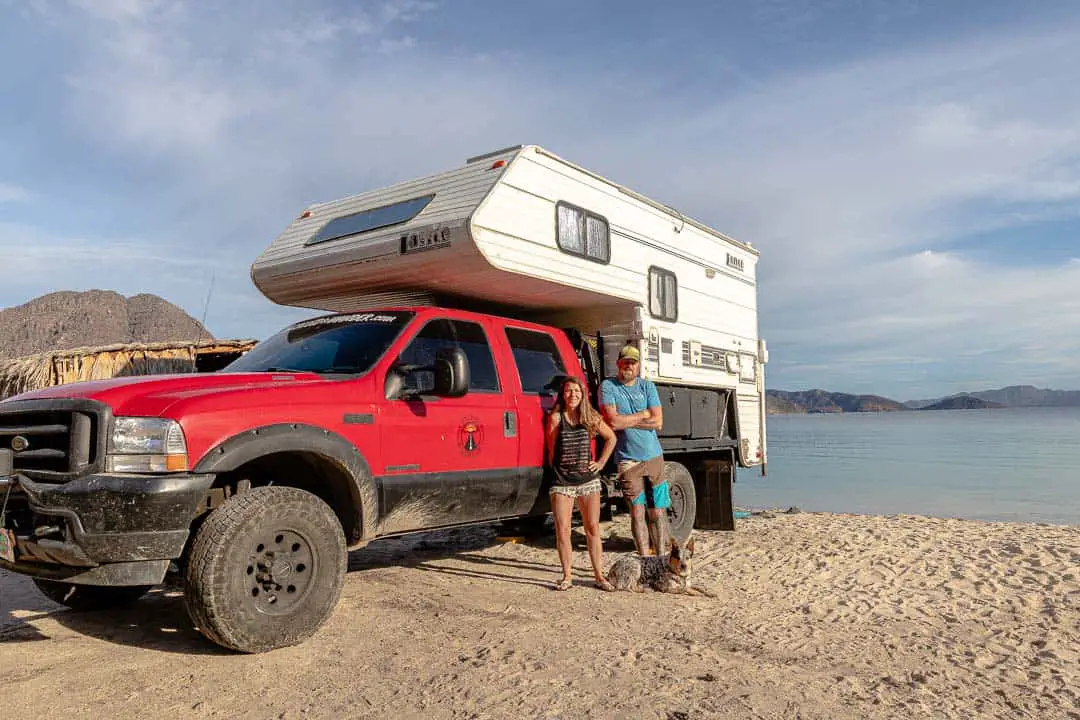Last Updated on February 23, 2022 by Chris and Lindsay
Of all of the types of RVs that you can choose from, living in a truck camper may be the last one you would consider. Unlike most other RVs that have their own set of wheels, a truck camper is designed to fit perfectly on a pickup truck. They are compact and typically offer limited amenities.
But we think truck campers are the perfect RV for adventure!
OUR TOP TRUCK CAMPER RESOURCES | |
Affiliate Disclaimer: This post may contain links to products we think you’ll like. If you purchase any of the products through the links below we’ll receive a small commission. As full-time RVers, we know our RV products well and only recommend those that we either own or would consider owning ourselves.
The Ultimate Guide to Truck Camper Life
Truck campers are truly unique RVs. And if you are like us and opt to customize a flatbed truck camper you can create an even more unique truck camper capable of meeting all of your needs.
Before you buy your truck camper (or to reassure you in your recent purchase!), here are a few things to consider about why truck campers are pretty awesome.
Why Consider Truck Camper Living?
Living in a truck camper is not for everyone. In fact, for those of us who have lived in one for any amount of time, there is a very tight-knit community of fellow truck campers eager to welcome and help anyone new to truck camper living.
But if you want to know why you should consider joining the truck camper community, here are a few reasons why we LOVE our truck camper and think you will too.
- Community. We have not met many truck campers who have not been incredibly friendly, conversational and overall appreciative of our company. Often we swap stories, admire the modifications we’ve made to our rigs and help make future plans for each other. Truck campers truly appreciate the uniqueness of our RV choice and look out for each other.
- Adventure. Living in any RV for any amount of time is an adventure. But a truck camper can take you to places you didn’t know existed (like the top of the world!) and show it to you in ways you never imagined. They are the perfect RV for both Alaska and Baja, and pretty much everywhere in between.
- Simplicity. Truck campers have everything you need compact into just enough space. Nothing more, nothing less. If something breaks, it’s not too hard to find and fix. And there are lots of great ways to maximize space without overcomplicating things.
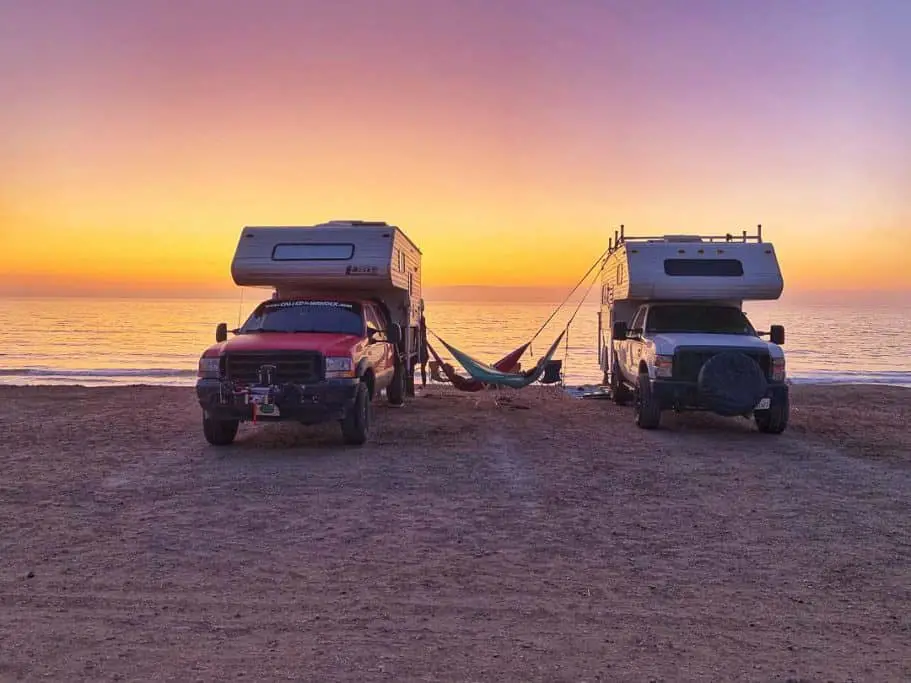
Truck Camper Pros and Cons
You have probably already surmised that we are big fans of truck campers. However, after nearly 3 years of living in ours, we did realize that the limitations of a truck camper can feel overwhelming at times.
So in all honesty, before you consider the truck camper life consider these pros and cons.
Notice that with a truck camper, some of its pros are also cons, which is why it takes a particular type of person to appreciate the fine line that makes truck campers amazing.
| PROS | CONS |
|---|---|
| Size (also a con) | Size (also a pro) |
| Separable (also a con) | Separable (also a pro) |
| Durability | Space |
| Mobility | Tank Capacity |
| Self-Contained | The expense of larger truck + camper |
| Headroom | Time-Consuming |
Truck Camper PRos
1) Size.
What some people find to be a disadvantage, we find to be an advantage. Our truck camper is 24 feet long and 11.5 feet at it’s highest. This is compact enough to fit into spaces where other RVs cannot go.
2) Separable.
Being able to separate the camper from the truck is definitely an advantage. You may need your truck for work or personal errands (what truck owner has never been asked by friends to help them move something!).
Or you may simply want to drop the camper so that you can ride more carefree through the mountains, as we have done in Montana and Virginia.
Being able to separate the truck camper is a great advantage shared only with camper trailers. It also helps to be able to separate the truck and camper in the event your truck or camper needs professional maintenance.
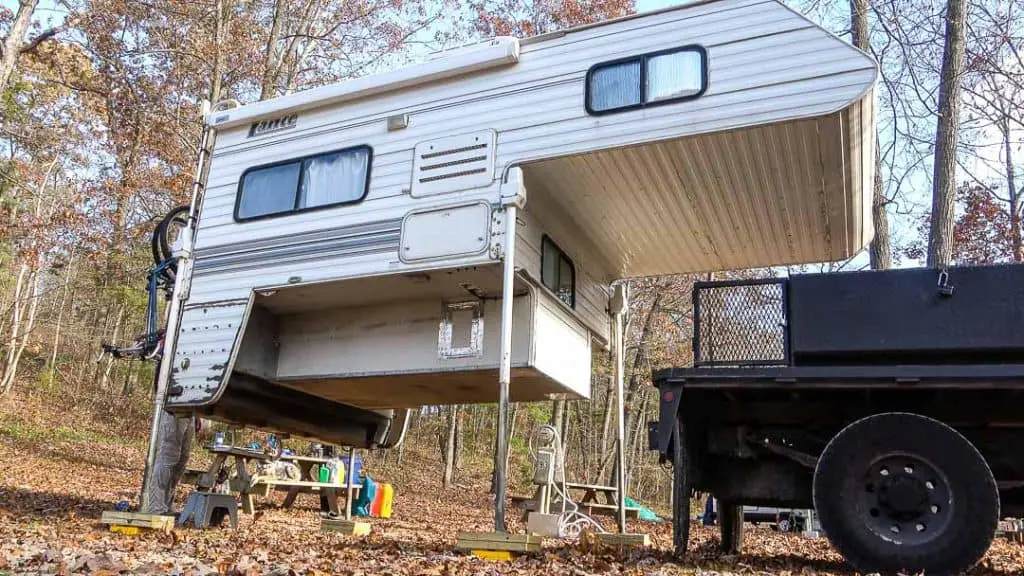
3) Durability (particularly offroad).
We don’t tend to worry too much about our truck camper when we take a turn off the pavement. And with 4wd, a winch and traction pads we hardly worry about getting stuck.
But we have seen our fair share of Class A motorhomes, Class B vans and Class C motorhomes driving gingerly among the rocks and gravel.
4) Mobility.
We like to go places many people do not. And while our truck camper has more weight than typical overland vehicles like Jeeps and Land Cruisers, it also has the ability to get us places a little further away than most.
While we are not as adventurous as some, we never question whether our truck camper will take us off-grid for a few days or weeks.
5) Self Contained.
Although the camper is small, it does contain everything that we need to spend a week or more off-grid in our own self-contained tiny home.
While we have mastered the art of dry camping in beautiful places across North America, we have relied on having a fully functional home complete with a kitchen stove and oven, refrigerator, bathroom shower and toilet, faucets, a bedroom and just enough space to sit and relax and enjoy the views while eating our meals or working from our salon.
A truck camper has everything you need, with very little wiggle room to determine what you don’t!
6) Headroom.
Before purchasing a truck camper we considered outfitting a van for our epic adventure to try and drive from Alaska to Argentina. However, as Chris is 6’4” it seemed there were very few van options that would accommodate his size.
But when we stumbled across a truck camper for the first time and stepped inside we were amazed at the amount of headroom and general space inside. Sure we still dance around each other at times to move through the camper.
But the fact Chris can do it without hunching over is amazing!
Truck Camper Cons
1) Space.
If you are someone who is used to living in a 3,000 square-foot home then adjusting to the size of a truck camper is going to be a challenge. Truck campers are definitely limited in space, inside and out. You won’t be storing anything more than what you need or use on a regular basis.
2) Tank capacity.
In a small environment, every bit of space is important. So most truck camper manufacturers limit the capacity of freshwater, grey and black tanks. Why is this important? Because tank space dictates how long you can go “off-grid” and how often you’ll be dependent upon formal campsites and dump stations.
3) Separable.
While it is great to be able to separate the truck from the camper, it is also a limiting factor that you cannot simply walk from one end of the camper to the other without having to leave the camper itself.
While almost all truck camper manufacturers include “pass-through windows” to allow you to squeeze between the truck and camper, in reality, they are not super practical.
Sometimes it would be nice to be able to go from the camper to the driver’s seat without going outside (inclement weather, knock on the door in the middle of the night, etc).
4) Size.
While the truck camper is self-contained, everything inside may feel a little smaller. Your refrigerator will likely be smaller than other RVs. And your bathroom is likely to be more compact.
Don’t expect to walk around the bed (or even to wake without hitting your head on the roof!). You might also be limited in the space on your roof for solar panels.
5) The expense of a larger truck.
If you want to overcome the limitations of space you can purchase a larger camper that has up to 2 slide-outs. But doing so requires that you purchase a larger, more expensive truck.
By the time you purchase the new camper and new truck, you might not feel like a truck camper is an advantage anymore.
6) Time-consuming.
An indirect disadvantage of not having space is that it typically takes more time to do simple tasks in a truck camper.
For instance, we don’t have an automatic coffee maker so we have to boil water every morning and pour it over our Aeropress. We also have to move items we’ve stored in our shower when we want to rinse off.
We find there are many little things that seem to take more time in our truck camper than they would in a brick-and-mortar home.
READ MORE: Check out this post for more thorough information on the pros and cons of owning a truck camper!
Can I Live In A Truck Camper Full Time?
If you are considering RVing full-time and you know you will appreciate the advantages of a truck camper, you are probably asking whether you can life in a truck camper full time.
The answer is – yes.
You can probably live in pretty much anything full-time. So the idea is that you have to understand your environment, choose your priorities and be ready to sacrifice convenience in exchange for the endless possibilities of where you can go and what you can do.
We lived for nearly 3 years “out of” our truck camper. Regardless of what RV you purchase, and how long you camp, most people do not buy RVs to live “in” them.
So look back at some of the cons of truck camper living and turn them into positives.
Space is limited, so make the most of it. Enjoy a more simplistic life. Things like daily showers and changing clothes hold less value than enjoying a cup of hot coffee while sitting beneath a thick forest or overlooking the mountains or beach.
Tank size is small, but you can carry extra water and do (most of) your business outside in many places you travel. When you don’t have neighbors you can shower outside (or not at all), wash your dishes and even do your duty with only the company of stars.
Simplicity is key if you want to truly enjoy full-time truck camper life.
READ MORE: Check out this post on our top 8 tips and tricks for living in a truck camper.
A complicating factor for us in living in a truck camper is that we also work full-time from the road. We often have to be within the range of cell phone coverage and many days we sit inside the camper and work from our salon. And our office is shared among our dogs’ playroom, the kitchen, dining room and couch!
Sometimes we like to think of how great life would be if all we had to do was wake up in the morning, choose our adventure and then go! But working along the way creates some situations where we could be in any RV (or home, for that matter).
Still, for the better part of 3 years, we found that full-time truck camper living was possible and presented a great alternative to other options we had in life.
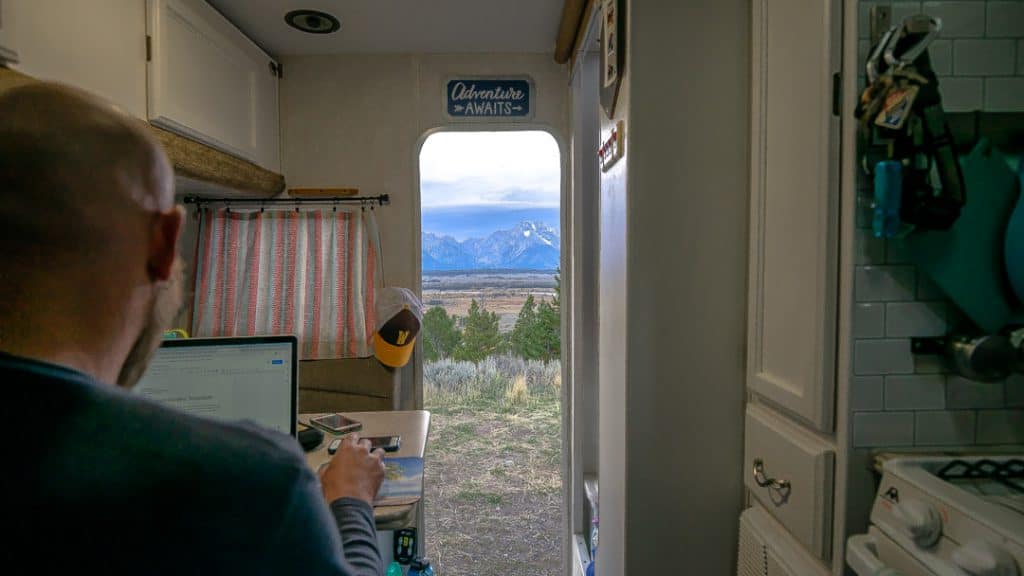
What to consider in purchasing a truck camper
Now that you’ve considered why you should purchase a truck camper (and understand some of its limitations), let’s get into some of the things you should consider when choosing a truck camper.
Of course, the separate nature of a truck camper is such that you can create a combination of truck AND camper. So unlike choosing other kinds of RVs, this is a little more complicated.
But you can always do simple, affordable modifications to your truck camper at any point in your adventure!
It helps in some ways if you already have a truck. Then you just need to find the right camper.
But if you’re starting from scratch, here are the basic considerations in choosing a truck camper.
Choosing a Truck
There are several factors to consider when determining which truck is right for you. Unless you buy an already paired truck and camper, you’re going to want to think about each of these considerations as you match your truck and camper.
Truck Size
You will typically need either a ¾ or full-ton pickup truck to carry your camper. Depending on the size of your camper and the weight you intend to carry, this decision will be important from a safety standpoint.
Half-ton pickup trucks are capable of carrying a very limited number of truck campers. But you will find the most common size trucks for campers are either ¾ or full-ton pickup trucks.
Also, note that most full-ton pickup trucks will be dual rear wheels and require certain campers to fit them properly.
Long or Short Bed
One of the first decisions is whether you want a long or short bed truck. This is important because campers are also designed to fit into either long or short beds.
Traditionally if you purchase a long bed truck you will have a long bed camper, which is by default larger than a short bed camper. Some long bed campers will allow you to have slideouts. But do note that the larger the camper the larger the truck you will need.
Also, note that we modified our truck camper in such a way that we put a short bed camper on a long bed truck (but you cannot do this the other way around!).
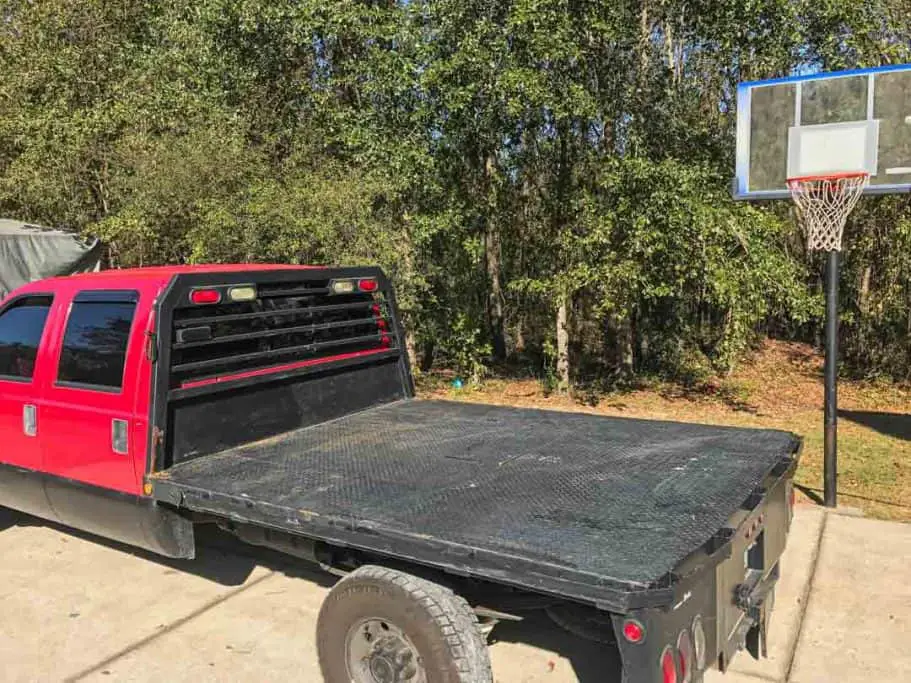
Standard or Flat Bed
Most truck campers are mounted to standard bed trucks. These include a sidewall that makes the camper seem to fit snuggly into the bed of the truck. Standard bed trucks are far more common and far less expensive than flatbed trucks.
But a problem we found with this particular setup, and why we chose to pair a flatbed truck with our camper, is that you lose a lot of space with the standard bed. Typically you have a “trap door” in the camper that allows you to access space in the truck bed. But this space is limited.
We built our truck camper on a flatbed and installed custom storage beneath the camper where the standard truck bed would normally have been wasted space. We turned the con of a small space into a pro by maximizing our storage opportunities.
Gasoline or Diesel
This decision is mostly a matter of preference. Diesel tends to be more fuel-efficient. But diesel fuel also tends to be more expensive so any savings for efficiency is potentially lost in the additional price of fuel.
We opted for the reliable 7.3L Powerstroke diesel in our 2002 Ford F250 because we knew this engine did not rely on modern DEF fluid and could handle all sorts of low-quality fuel if we came across it.
Our initial goal was to drive through Central and South America and we knew that we would find sub-par fuel at some point. Diesel engines tend to require more costly maintenance along the way.
But with proper maintenance, they also last longer than gasoline engines.
Single or Dual Rear Axle
You will want to consider a single or dual rear axle (dually) when selecting your truck. This decision will mostly be made from whether you want to carry more or less weight.
A larger camper will require a larger truck to carry it and dually trucks can carry more of that weight. But if you want to go light, or avoid the maintenance of an extra set of tires, then a single rear wheel axle truck will do the trick.
Just note that the type of truck you select will necessarily limit you in the type of camper you can choose. Standard campers will not be able to fit around the wider wheelbase of a dually truck.
So you will either need to select a larger camper that accommodates this or invest in dually brackets for the camper that swing wide to allow the truck to fit beneath the camper.
2 or 4 Wheel Drive
This is a matter of personal preference rather than necessity. If you are the kind of person who knows how to navigate the off-road or just want to have the added peace of mind of knowing that you could, then you likely won’t need 4WD.
We were of the latter when we opted for a truck with 4WD. While we lacked confidence in going off-road (and getting ourselves unstuck, if it happened) we did have 4WD that came in handy a few times (particularly camping at Lone Rock Beach on Lake Powell and in an overland Baja adventure).
But most places you will consider going, even in a truck camper, will not require 4WD.
Cab Style
Cab style is another personal preference. We knew that we were going to live in our truck camper for at least 3 years as we traveled between Alaska and Argentina.
So to counter for the traditional lack of space in a truck camper, we opted for the largest crew cab we could find. But there are plenty of truck campers on standard cab pickup trucks. It really depends on how many passengers you have (including your pets) and how much space you would like to store things.
Note that we removed our backseat and built custom shelves that accommodated our inflatable SUP and kayak, our dog’s crate and several bins that we filled with knick-knacks.
Suspension & GVWR
A friend of ours pointed out that when you live in a truck camper full time your entire life is literally suspended upon the tires of your truck.
For this reason, you will want to consider both higher quality tires (an upgrade you can make later) and a truck with a suspension system that can handle the additional weight of your slide-in camper. You can always beef up your suspension later, as we have done on several occasions to ours.
But you definitely want to keep in mind how much weight you intend to carry as you consider which truck to purchase. Also, consider the Gross Vehicle Weight Rating (GVWR) and whether the truck you choose will be able to carry the weight you intend to put on (or behind) it according to the manufacturer’s specs.
READ MORE: Consider building your own flatbed truck camper using this post as your guide.
Choosing a Slide-In Camper
Choosing a camper is just as important as choosing a truck. While the truck will bear the responsibility and weight of carrying your life, your camper will be your home (or home away from home) while you travel.
So you do want to make sure you find a camper that you like, but that also meets the criteria you have for your truck.
These are the primary things to consider when choosing a slide-in camper.
Type
There are several primary types of truck campers. While some people consider that a topper creates a technical truck camper, this post does not consider a truck + topper combination a truck camper.
While it will allow you to stow things and provide a place you can sleep, it does not have the amenities that all other standard truck campers will have. So we will gloss past this type of truck camper.
The next most basic truck camper is a pop-up truck camper. These are great for people who want to have low-profile clearance and lesser weight.
Many pop-up truck campers actually fit on ½ ton or smaller trucks, so you may see more hardy Toyota trucks carrying them off into the rugged wilderness. If you are a minimalist more interested in being able to get to remote places light and easy, you’ll be interested in a pop-up truck camper.
But with pop-top campers, you will need to raise and lower the top each day. Further, they do not withstand extreme weather as well. We have read stories of truck campers in Patagonia and Alaska sleeping huddled up on their floor because the cold wind and rain were too much for the pop-up camper.
You’re also going to sacrifice storage space with a pop-top camper. But being lightweight and agile is a great advantage if that is what you are looking for in a truck camper.
The next step up is a hard-sided camper. These are the more typical truck campers you are likely to see on the road. As the name suggests, they are hard-sided and fully enclose the entire camper.
You will have more permanent space in these, with mounted cabinets and appliances that might be lacking in a pop-up truck camper. You won’t need to raise and lower it each day. However, naturally, they are heavier and have a higher profile than pop-up campers.
With hard-sided slide-in campers, you will have a variety of options to accessorize your truck camper. There will be different bathroom options (wet vs dry bath) and you can even add extra room with a slide-out space.
Beyond hard-sided campers, you enter the realm of more custom chassis conversion truck campers. With these, the bed of the truck is removed or modified in such a way that the camper is permanently mounted on the frame of the truck.
Clearly in this case the truck and camper cannot be separated. However, having one cohesive unit makes this style truck camper more like a Class A, B or C style motorhome where everything is attached in one simple structure. You can typically pass through between the truck and camper and they are built to be rugged.
When looking at chassis conversion truck campers you are going to see much higher price points due to the amount of customization required to convert the truck and camper into this single unit.
Obviously, you will want to consider whether this price point and the single-structure nature of the chassis conversion meets your goals for truck camper living. Personally, this style truck camper was well beyond anything we imagined we would need or want.
Long or Short Bed Style
You are most likely going to want/need to match the style truck camper with the truck you choose. So if you are shopping separately try to decide whether you want a short bed camper or a long bed camper before you commit to purchasing a truck.
We proved that it is safe and possible to put a short bed camper on a long bed truck. But you definitely can’t put a long bed camper on a short bed truck.
There are clear differences between long and short bed camper styles.
The most obvious is that long bed campers will have more space and room to store things and spread out. When we visit our friends with a long bed camper it is like stepping into a house compared to our short bed camper.
But long bed campers will also be heavier and require a larger truck, especially if you opt for a camper that has slide-outs.
READ MORE: Learn how quick and easy it is to load and unload your truck camper using these tips.
Slides
Since space is the most common shortfall for truck campers, many manufacturers offer slide-out compartments on their models to provide a little added room.
Typically you can have one slide that pushes out from the back or side and exposes more floor space. Two-slide models are also becoming more widely available. And there are even 3-slide truck campers on the market.
Obviously the more space you are adding with a slide the more weight you will carry. Most truck campers with slide-outs must be mounted on full-ton dually pickup trucks. You may see even more heavy-duty trucks accommodating these massive slide-in campers.
But if you are looking for a little more space and you do not mind the added weight and need to slide the room in and out each time you want to use it, then find a truck camper with a slide is a great idea.
Bathroom Setup
Most truck campers conserve space by providing what is called a “wet bath.” This means that both the toilet and shower are in the same space.
You could literally sit on the toilet and take a shower at the same time! If you prefer to keep things together in consolidating space then a wet bath is a great idea for you and increases the number of camper options you will find.
But there are some truck campers that separate the toilet, shower and sink in what is referred to as a “dry bath.” These are clearly going to be found in larger camper models.
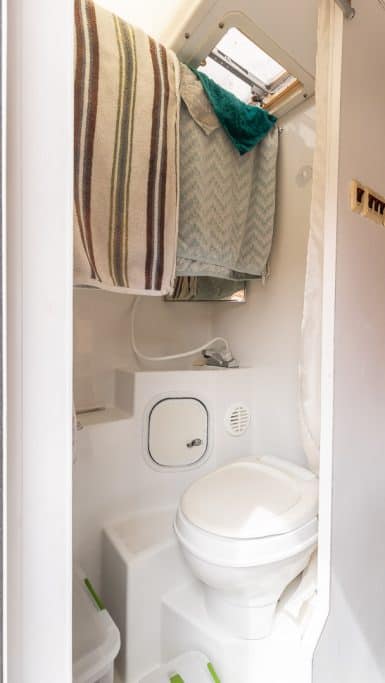
Jack Types
While not necessarily the most important factor in deciding on which truck camper to purchase, the type of jack definitely comes to mind when considering how often you plan to separate your truck and camper.
Electronic jacks make removing the camper a matter of simply pushing a button. But manual jacks mean that you will have to hand-crank each jack until it lifts the camper off the truck or ground.
While putting the camper on the truck is a relatively simple process, if you plan to do this frequently you’ll want to find a camper with electric jacks.
READ MORE: Check out this post on 18 easy and affordable truck camper modifications you can do to upgrade your truck camper!
Other things to consider about living in your truck camper
Once you have decided to join the growing community of truck campers you will find reassurances that you made a great decision. But you’ll probably also find that there are a number of things that you do not know or completely understand about your truck and camper.
In this section, we’ll briefly cover some of the other things to consider when opting to live in a truck camper.
What are some truck camper essentials I should invest in owning?
There are many essentials that every RV owner should have. But things that we would recommend you invest in specifically as a truck camper owner include the following items.
Solar power system kit
Even a basic solar kit allows you to explore off-grid destinations without worrying about power.
Honda 2200 Generator + Companion (optional) + Parallel Cable (Optional)
If your truck camper does not come equipped with an on-board generator, these are the best and quietest you can buy. Get 2 and hook them together in parallel to combine them to power your AC.
Viair Air Compressor
We never consider traveling in any vehicle without having our Viair air compressor. It is small and powered by the onboard batteries so there is no excuse to not be safe while traveling.
Traction Tracks
Whether you plan to go off-road often or not, these will come in handy to get you unstuck when you find yourself in the soft sand or mud.
Oversized bottle jack and/or
The bottle jack that comes with your truck is likely not heavy-duty enough to lift both your truck and camper. This 20-ton jack should be enough. Be sure to practice changing a tire before you hit the road!
Farm Jack (for a flatbed truck camper)
This farm jack is a quick way to lift the bed of your truck if you have a flatbed truck camper. We use the 20-ton bottle jack to support the truck axle once it was lifted enough to change tires.
12,000+ lb winch + block & tackle kit
We consider a winch the most expensive insurance policy to keep us out of trouble. You may consider it a toy. However you consider it, we recommend you add a winch to your truck camper setup for added safety.
Portable truck battery jumper
These are lightweight and portable enough to store pretty much anywhere. And with enough power to jump most trucks, there is no reason not to carry one.
Leveling blocks
You need these for convenience in leveling your camper, but also to keep your fridge from breaking at too steep of inclines. They can also help you dig out of the sand or mud if you don’t have traction tracks.
Fuel jerry cans (diesel + gasoline as necessary)
It is always good to carry extra fuel. We always had diesel for our truck engine and gasoline for our Honda generators. Although we never had to use these ourselves, we were able to help out a handful of strangers stranded on the side of the road.
READ MORE: For more information about these and other truck camper essentials that we recommend, you can check out this post.
How do I load and unload my truck camper?
Loading and unloading your truck camper can be a nerve-racking experience. In fact, the most tension in our marriage has come from this process!
But we have a great post you can read about here on how to load and unload your truck camper.
We’ve also put together a great short video to help ease your nerves and give you a little more confidence about the process!
Does my truck camper come with a title?
Typically trucks and campers are considered separate entities both for registration and insurance purposes. In our case, neither the state of Florida nor our auto insurance company required any form of title on the camper (which is great because there was never a title issued!).
Our camper did come with a manufacturer ID number on the back. But this is the only way we could differentiate our camper from any other identical models. When transacting a purchase or sale of a slide-in camper be sure to find any form of identification such as this.
How do I insure my truck camper?
Campers are typically considered “cargo” on your truck and you can insure them as such. For our policy, we had to carry an auto policy on our truck (including damage to the camper when on the truck) but we also had to carry a renter’s policy to cover the contents of our camper.
You can get great RV insurance options through GoodSam, as they are in the business of understanding the nature of RVs moreso than the standard auto insurer. However, most of the major auto insurers will work with you once you help them understand what a slide-in truck camper is.
What do I do if my truck breaks down?
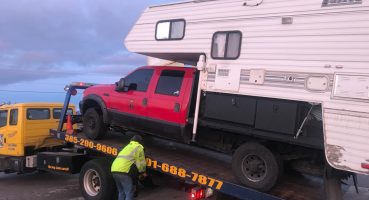
While not a question you want to ask, it is important to know that if your truck breaks down you must consider that it becomes increasingly more difficult to separate the truck from the camper (depending, of course, on what the issue is).
When we had a near-catastrophic breakdown we had to have the entire truck camper towed.
This presented all sorts of issues (total height of truck camper + tow truck, angle of loading/unloading truck) that we would rather have not dealt with. So after the experience of using our standard auto insurance to provide towing services, we opted to join GoodSam’s Roadside Service.
Yes, we are affiliates for them, meaning we receive a small commission if you also choose to purchase their services. But we found that the peace of mind we have in knowing that they know and can accommodate specifically for truck campers in the event of towing has made all the difference for us. Check here for rates to join.
Are there places you cannot go with your truck camper?
While truck campers are quite nimble and agile, particularly as compared to other RVs, you still want to be aware that there are places you may not be able to travel.
Know your clearance (both topside clearance of your roof and vent covers as well as ground clearance) and your weight because you will likely come across bridges and overpasses that will limit your ability to pass beneath them.
You will also want to be aware of your turn radius in the event you are unable to turn around. Yes, we’ve had dozens of experiences of holding up traffic because we could not pass in places where our navigation was sending us.
What about places you CAN go with your truck camper?
One of the reasons we really love our truck camper is that it allows us to reach places that many other RVs cannot.
Whether it is bouncing down dirt roads with higher clearance and hardier suspension than vans or Class C motorhomes, or fitting into campsites intended for tent campers in standard automobiles, a truck camper can take you to places you cannot reach (easily) by other RVs.
This is a huge benefit of owning a truck camper so take advantage of the fact that you can explore both wide-open spaces as well as more confined city limits in your truck camper.
Are truck campers good for living off-grid?
We like to think that any RV is capable of living off-grid as long as you consider power and water as your most important necessities. If you are fully supplied in water, and even consider carrying additional water containers, then you can last weeks off-grid.
And if you equip your camper with solar panels and an inverter you can have virtually unlimited power. Of course, you’ll want to know how much food you can store away. And keep enough fuel to take you wherever you’d like. Otherwise, truck campers are great for off-grid exploration!
What truck camper does Called To Wander own?
We lived out of this incredible truck camper for nearly 3 years. It is a long, flatbed 2002 Ford F250 7.3L Turbodiesel crew cab with a 2004 Lance 845 short bed camper. Our favorite memories were in Alaska and Baja, both of which are perfectly suited for truck camper exploration.
Learn more about how we outfitted our customized flatbed truck camper to be able to take us from Alaska to Argentina in this post (though note that we have been unable to complete this journey to date).
